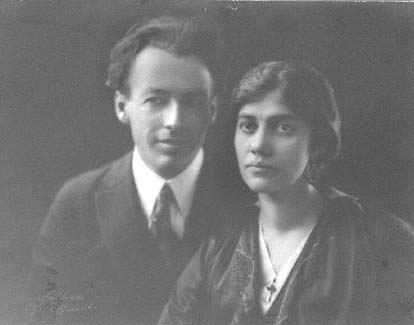Browne, Maurice (1881-1955)
Maurice Browne is a name familiar to readers of Autobiography. English by birth and education, he came to the States around 1910 for the love of an American girl from Chicago, met in Florence, Italy, Ellen Van Volkenburg, known as Nellie Van, who became his wife. Something of a literary rebel, Maurice Browne gave a series of controversial lectures on such vanguard writers as Wilde, Shaw and H.G. Wells. After difficult times, in hardship and dire poverty, they founded The Chicago Little Theatre, inspired initially by Dublin's famous Abbey Theatre and from then on, dedicated themselves to their ideal, "the re-creation of poetic drama", experimenting with all sorts of daring approaches which are now often incorporated into modern theatrical techniques.

Special Collections Library, University of Michigan
Thanks to their labour, "The American Little Theatre Movement" had begun and by 1920 there were thousands of "Little Theatres". It was in the States that Maurice met John Cowper Powys through Louis Wilkinson who was a friend from Cambridge times. A poet himself, he also was a close friend of Arthur Ficke. John Cowper, writing of his close relationship with Maurice Browne and his Little Theatre when he was in Chicago, conjures up that special atmosphere he enjoyed so much:
I spent long enough in Chicago to become the only privileged outsider in this remarkable Little Theatre group. Maurice Browne became my intimate friend, and my impressario (sic) too, for he used to trick out his Little Theatre in the Fine Art Building with consummate skill for my orations and according to my subject, and as he himself chose these subjects, they were sufficiently startling; and here, for the one and only time in my life, I was destined to play the Intellectual Pierrot against an appropriate Yellow-Book background. (Autobiography)And Maurice Browne remembers:
How well I can now see Maurice's expressive physiognomy quivering with vibrant reciprocity as it responded to my sallies, until, like a holy stag in a mediaeval tapestry when the wind shakes the arras, he would toss his Mephistophelean baton into the air and dissolve the enchantment he had called up.(Autobiography)
Our three intimates, Mary Wood, Ficke and Powys, had been given the freedom of the theatre; in Chicago it was the two men's home....Whatever brought Powys to Chicago brought Ficke. To us three men, lifelong, the gods gave rock-like friendship. Powys was my antithesis: a corrective and a challenge; no man whom I have known has influenced me more deeply, and always towards kindness, humility, consideration for others. Ficke was my twin; we wandered at will through each other's thoughts without need of speech, protesting irritably when we recognised ourselves in the other's mirror. (Too Late to Lament)
|
|